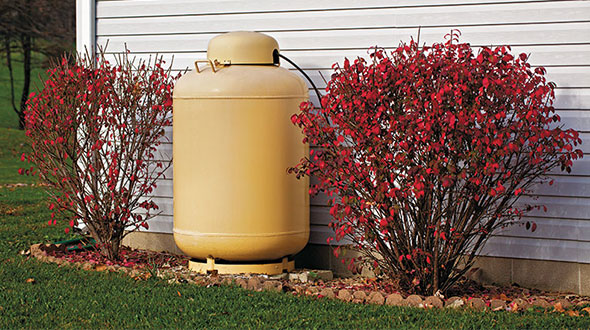Propane provides energy dependability and security
Public utilities and energy co-ops have always found challenges in offering the same level of dependability and energy security that a tank full of propane in the backyard provides to the consumer. Many things can happen in the production and transmission of electricity and natural gas over long distances that result in interruptions of service.

Photo: iStock.com/DonNichols
Admittedly, our propane customers have had a difficult time making that connection. It is up to you and me to help them understand.
Consumers are starting to realize the advantages of on-site energy with the increased popularity of on-site solar photovoltaic and solar thermal installations.
The electricity produced by a solar photovoltaic system is used to power equipment and to recharge a battery storage system so it can be used later. While this on-site energy source may, to some degree, enhance the dependability of electricity coming from the power grid, there are disadvantages.
The high cost of solar systems, even with rebate programs, is a sticking point for many consumers. Solar systems are often sold with the promise that the customer can sell surplus power back to the public utility. Such sell-back programs are called net metering and are available in more than 40 states.
The problem is that such programs are regulated on a state-by-state basis and get a lot of pushback from the electric utilities. In many cases, the utility offers to pay very little for the on-site electricity produced and caps the purchase quantity at a low level.
Another disadvantage of such solar systems is that they are weather dependent: no sunlight, no electricity.
Add in the fact that toxic materials and hazardous products are used in the production of solar panels and batteries, and solar doesn’t look so much like the ideal on-site energy source.
On the other hand, residential propane tanks and related gas system components are manufactured from a high percentage of recycled metals and other materials that are almost entirely recyclable at the end of their service life, often decades down the road.
Propane-solar partnership
A propane partnership with solar photovoltaic systems involves the installation of a propane standby generator for when off-site and on-site electricity fails, and it will.
On-site solar thermal systems offer the better opportunities for propane partnerships.
Rinnai is one of several tankless water heater manufacturers that offer a solar gas booster system for domestic water heating. A solar rooftop unit is combined with a hot water storage tank and a tankless gas water heater to boost water temperature in the storage tank when hot water usage exceeds system capacity and when the sun doesn’t shine.
Such systems offer on-site thermal energy for heating water in sunny parts of the country, and on-site propane makes it all dependable. Such solar thermal systems can potentially reduce electricity consumption, running costs and environmental impact of a hot water system by two-thirds. Your customers who have environmental concerns may want to install such a system.
Off-site solar farms and wind farms do not offer consumers added dependability and energy security because they deliver the electricity produced on the same old outdated power grid that has failed consumers repeatedly in the past. Off-site renewables are also driving up the cost of electricity and making propane seem like a bargain in comparison.
On-site energy is always the best choice, and propane has been doing it well for more than 100 years. Nothing in the advancement of off-site renewables is going to change that.
Tom Jaenicke is vice president of propane marketing services for Warm Thoughts Communications. He can be reached at 810-252-7855.
















